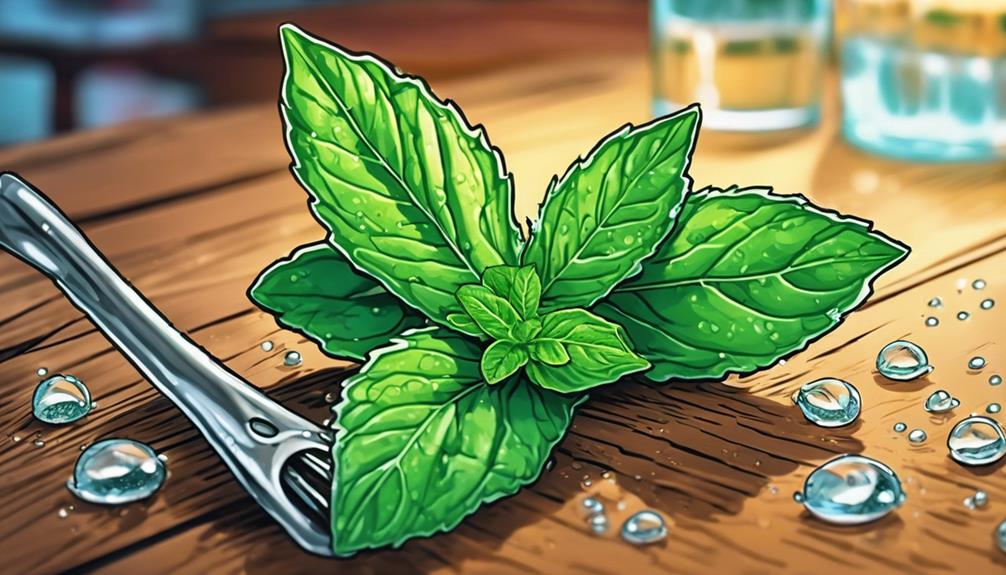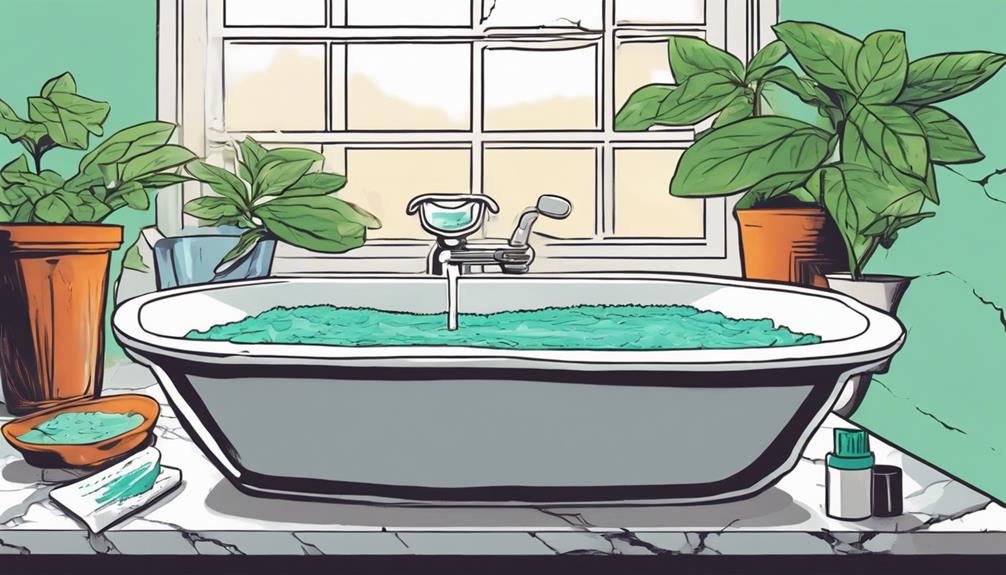To avoid bad breath forever, you've got to stick to a solid oral hygiene routine. Brush your teeth twice a day and don't forget to floss to clean between those hard-to-reach places. Scrape your tongue too, as bacteria love to hide there. Opt for fresh, crunchy fruits and vegetables, and stay away from strong-smelling foods like garlic and onions. Staying hydrated is key, so drink plenty of water. Regular dental check-ups will keep your smile fresh and healthy. There's more to discover about maintaining fresh breath, so keep exploring options for a long-lasting solution. Here are a few tips for fresh kids breath: encourage your children to brush their teeth at least twice a day and make it a fun activity by using colorful toothbrushes and tasty toothpaste. Teach them the importance of flossing as well, and remind them to drink water throughout the day. Taking your kids to regular dental check-ups will also help ensure their breath stays fresh. It’s never too early to start teaching them good oral hygiene habits for a lifetime of fresh breath.
Key Takeaways
- Maintain excellent oral hygiene by brushing twice daily, flossing, and using antibacterial mouthwash to eliminate odor-causing bacteria.
- Stay hydrated to promote saliva production, which washes away food particles and neutralizes odors.
- Avoid strong-smelling foods and sugary snacks that encourage bacteria growth and contribute to bad breath.
- Incorporate crunchy fruits and vegetables into your diet to naturally clean teeth and boost saliva flow.
Understanding Bad Breath
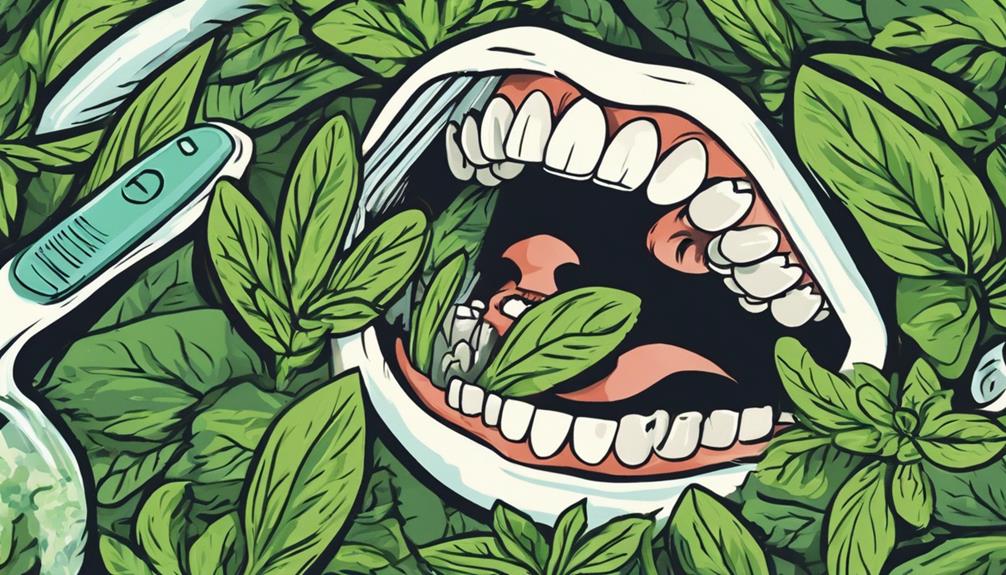
Many people don't realize that bad breath, or halitosis, often stems from poor oral hygiene and the buildup of bacteria in the mouth. When you neglect your oral care routine, food particles linger, allowing bacteria to thrive. This bacteria produces sulfur compounds, leading to unpleasant odors. If you're experiencing chronic halitosis, it might be a sign of deeper issues.
Dry mouth, or xerostomia, can also exacerbate bad breath. Saliva plays an essential role in washing away food particles and bacteria. When saliva production decreases, it creates an environment where bacteria flourish. Additionally, tobacco use not only contributes to bad breath but also increases your risk of gum disease, which can further complicate the issue.
Certain health conditions, such as respiratory infections or gastrointestinal disorders, may manifest as persistent bad breath. It's important to pay attention to your oral hygiene and overall health.
Regular brushing, flossing, and dental check-ups can help you combat the bacteria responsible for bad breath. By understanding the factors that contribute to halitosis, you can take proactive steps to prevent it from becoming a chronic issue in your life.
Key Causes of Halitosis
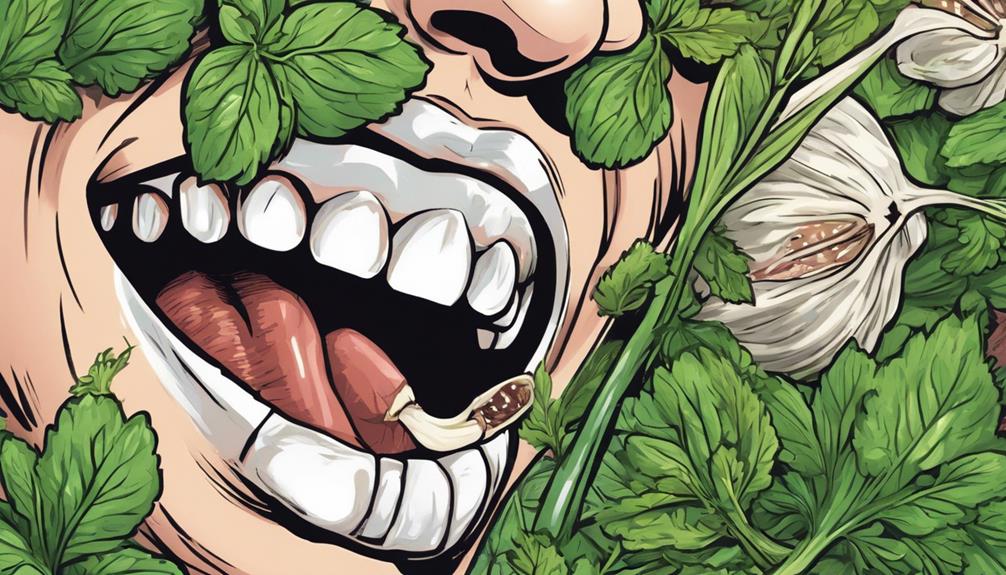
Several key factors contribute to halitosis, making it important to identify and address them for effective prevention.
One major cause of bad breath is poor oral hygiene. When you don't brush and floss regularly, food particles remain in your mouth, allowing bacteria to decompose them and produce foul odors. Certain foods, particularly garlic and onions, can also lead to persistent halitosis, as their strong odors linger until fully digested.
Dry mouth, or xerostomia, greatly exacerbates the problem by reducing saliva flow, which is essential for neutralizing odors and washing away food particles and bacteria. Additionally, tobacco use not only promotes gum disease but also leaves a lingering smell that worsens bad breath.
Underlying health issues, such as gum disease, respiratory infections, and digestive disorders, can further contribute to chronic bad breath. If you're experiencing persistent halitosis despite maintaining proper oral hygiene, it's important to reflect on these factors.
Identifying the root cause can help you implement effective strategies for freshening your breath and improving your overall oral health.
Effective Oral Hygiene Practices
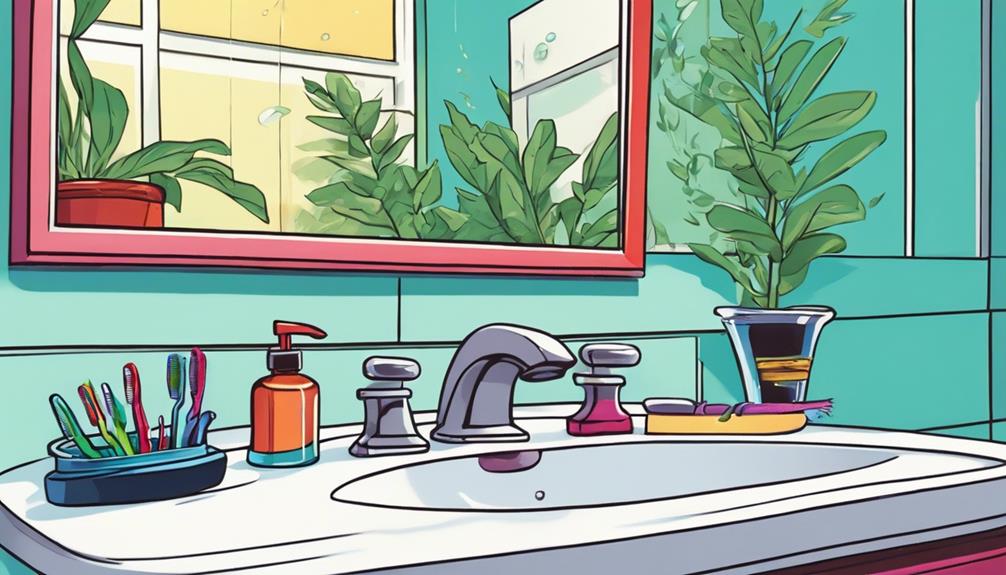
Maintaining effective oral hygiene practices is key to combating bad breath and guaranteeing your mouth stays fresh and healthy. Start by brushing your teeth at least twice a day with fluoride toothpaste. This will help remove food particles and plaque, which are major contributors to halitosis.
Don't forget to floss daily; it's essential for cleaning between your teeth, where toothbrushes can't reach, and eliminating trapped food debris that encourages bacteria growth.
Incorporating tongue scraping into your routine can further reduce the buildup of bacteria on your tongue, a common source of foul odors. Additionally, using an antibacterial mouthwash can effectively kill odor-causing bacteria, providing you with long-lasting fresh breath.
Scheduling dental check-ups at least twice a year is also fundamental. These visits guarantee professional cleanings to remove tartar buildup and allow for early detection of any oral health issues that may contribute to bad breath.
Remember that proper saliva production is critical; it helps wash away food particles and bacteria. By following these effective oral hygiene practices, you can greatly reduce your chances of experiencing bad breath and maintain a healthier mouth.
Dietary Choices for Fresh Breath

When it comes to fresh breath, your dietary choices play a key role.
By avoiding strong-smelling foods and opting for breath-freshening alternatives, you can make a significant difference.
Let's explore the best and worst foods for keeping your breath pleasant.
Foods to Avoid
To keep your breath fresh, steer clear of foods high in sulfur compounds, like garlic and onions, which can leave a lasting odor. These strong-smelling foods can linger not just in your mouth, but also in your digestive system for days, contributing to bad breath.
Dairy products, particularly cheese, also fall under the foods to avoid. Their fat content can lead to bacterial growth if not properly cleaned from your mouth. Processed meats like pastrami carry similar risks; as they break down, they can create unpleasant odors that contribute to halitosis.
Additionally, sugary foods and drinks can be detrimental. They promote bacterial growth and plaque formation, worsening your oral hygiene. Acidic beverages, such as orange juice and alcohol, can dry out your mouth, reducing saliva which is essential for washing away food particles and bacteria.
Breath-Freshening Alternatives
What if you could easily improve your breath by making simple dietary choices? Incorporating breath-freshening foods into your diet can greatly combat bad breath. Start with crunchy fruits and vegetables like apples and carrots; their natural texture helps clean your teeth and boost saliva production, both essential for fresh breath.
Don't forget about herbs! Parsley and mint aren't only tasty but also packed with antibacterial properties that neutralize odors.
Drinking green tea is another smart choice—it contains polyphenols that reduce bacteria responsible for bad breath, promoting a fresher mouth.
Including yogurt in your meals enhances your oral health thanks to its probiotics, which fight odor-causing bacteria in your mouth.
Professional Treatments and Solutions
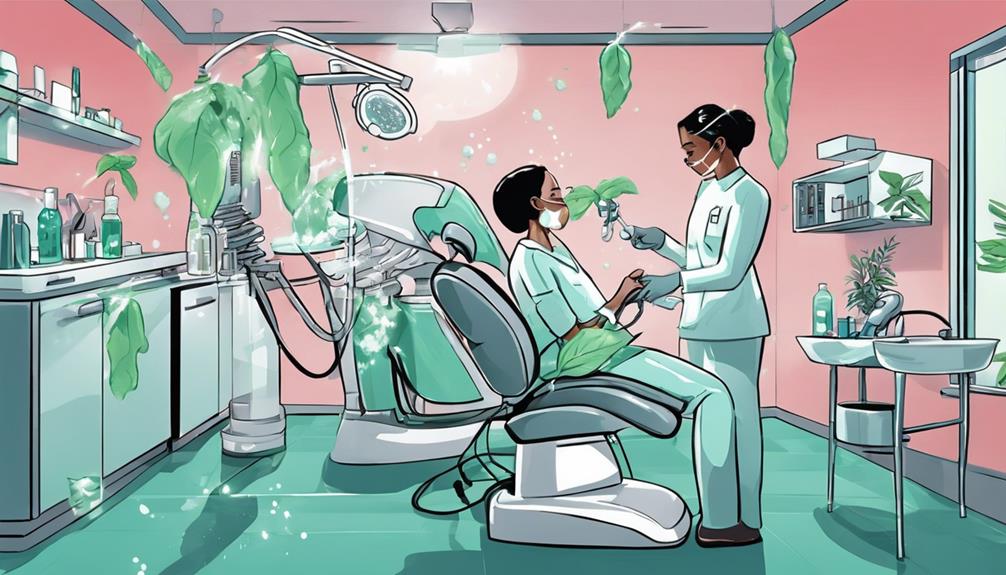
Professional treatments can tackle bad breath effectively by addressing the root causes and implementing tailored solutions.
Regular professional cleaning, usually recommended twice a year, removes plaque and tartar buildup that contribute to halitosis. Your dentist can create personalized treatment plans to address underlying issues like gum disease or cavities, which may lead to persistent bad breath.
If you struggle with chronic dry mouth, your dentist might suggest saliva substitutes or medications to stimulate saliva production, helping to combat odor. Additionally, antibacterial mouth rinses prescribed by dental professionals can greatly reduce odor-causing bacteria in your mouth, enhancing your breath freshness.
For those with more severe dental health issues, advanced treatments like scaling and root planing or laser therapy may be necessary. These treatments not only improve oral hygiene but also help manage long-term bad breath effectively.
By working closely with your dentist, you can establish a thorough approach to eliminate bad breath, ensuring you maintain fresh breath for the long haul.
Don't underestimate the power of professional care in your battle against halitosis.
Lifestyle Changes for Prevention

To keep bad breath at bay, you need to focus on a few key lifestyle changes.
Maintaining good oral hygiene, staying hydrated, and limiting odor-causing foods are essential steps you can take.
Maintain Oral Hygiene
Maintaining oral hygiene is essential for preventing bad breath and involves simple daily habits that can make a notable difference. By adopting the right practices, you can effectively combat halitosis and keep your breath fresh.
Here are three key habits to incorporate into your routine:
- Brush Twice a Day: Make sure to brush your teeth for at least two minutes each time. This helps remove food particles and plaque, considerably reducing the risk of bad breath.
- Daily Flossing: Flossing removes trapped food and plaque between your teeth where your toothbrush can't reach. This is vital to prevent bacteria buildup that leads to unpleasant odors.
- Use a Tongue Scraper: Don't forget to clean your tongue! Using a tongue scraper or toothbrush can effectively reduce odor-causing bacteria residing on the back of your tongue.
Additionally, rinse with an antiseptic mouthwash after brushing and flossing for added freshness.
Don't forget to schedule regular dental check-ups at least twice a year to catch any issues that could contribute to bad breath.
Stay Hydrated Daily
Staying adequately hydrated each day is vital for preventing bad breath and keeping your mouth healthy. When you stay hydrated, it boosts saliva production, which plays a significant role in washing away bacteria and food particles that cause bad breath. Without enough water, you risk developing dry mouth, a leading contributor to halitosis. Regular hydration not only combats this but also guarantees your mouth remains a hostile environment for odor-causing bacteria.
Incorporating hydrating foods like cucumbers and watermelon into your diet can enhance moisture levels in your mouth, further supporting your oral health. It's also important to avoid diuretics such as caffeine and alcohol, as they can dehydrate your body and exacerbate dry mouth.
To complement your hydration efforts, consider chewing sugar-free gum after meals. This can stimulate saliva flow, keeping your mouth moist and helping to eliminate lingering food particles.
Limit Odor-Causing Foods
What you eat can dramatically impact your breath, so limiting odor-causing foods is crucial for freshening it up. Certain foods, particularly those high in sulfur like garlic and onions, can lead to bad breath that lingers for days.
To keep your breath fresh, consider the following:
- Limit intake of strong-smelling foods: Avoid excessive consumption of garlic, onions, cheese, and certain spices that can contribute to halitosis.
- Stay mindful of beverages: Orange juice and alcohol can also leave residue that affects your breath. Choose water or herbal teas instead.
- Rinse and refresh: After enjoying odor-causing foods, rinse your mouth with water to wash away lingering particles.
Incorporating sugar-free gum or mints after meals can stimulate saliva production, which is essential for maintaining fresh breath. Saliva helps neutralize odors and wash away food particles, making it an important ally in your fight against bad breath.
Frequently Asked Questions
How Can I Stop Bad Breath Permanently?
To stop bad breath permanently, maintain a strict oral hygiene routine, stay hydrated, avoid high-odor foods, and schedule regular dental check-ups. Using antibacterial mouthwash and sugar-free gum can also help keep your breath fresh.
How Do I Make Sure My Breath Never Stinks?
Imagine fresh mint versus stale leftovers. To guarantee your breath never stinks, brush and floss daily, stay hydrated, scrape your tongue, chew sugar-free gum, and visit the dentist regularly for ideal oral health.
How Can I Make My Breath Smell Good Forever?
To make your breath smell good forever, brush and floss daily, stay hydrated, chew sugar-free gum, and limit strong-smelling foods. Regular dental check-ups will help keep your mouth healthy and fresh.
Can Bad Breath Ever Be Cured?
Bad breath can often be managed but rarely completely cured. You should focus on consistent oral hygiene, addressing underlying health issues, and maintaining regular dental check-ups to keep your breath fresh and minimize odor.
Can Following The Secret to Avoiding Bad Breath Forever Help Fix the 10 Reasons Your Breath Smells Bad?
Are you tired of dealing with bad breath? Discovering how to fix bad breath could be the solution to your problem. Following the secret to avoiding bad breath forever might just be the key to eliminating the 10 reasons your breath smells bad. Start saying goodbye to smelly breath today!
Conclusion
To sum up, keeping your breath fresh isn't just about brushing your teeth; it's a lifestyle!
Did you know that nearly 85% of people with persistent bad breath have an underlying dental issue?
By following effective oral hygiene practices, making smart dietary choices, and adopting healthy habits, you can be part of the 15% who enjoy fresh breath effortlessly.
So, take charge of your oral health, and say goodbye to bad breath for good!
